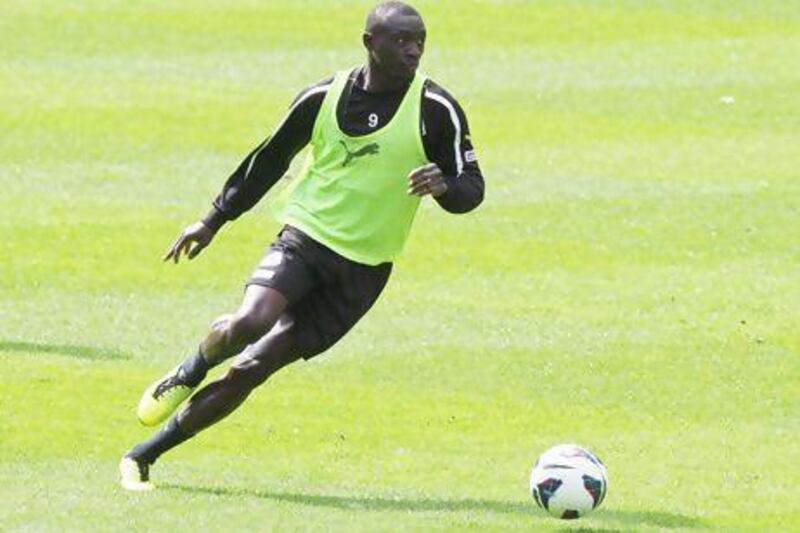For Papiss Cisse and Newcastle United, it is a case of who blinks first.
The Senegalese striker, a devout Muslim, has pulled out of his team's pre-season tour of Portugal after refusing to wear the new kit sponsored by Wonga, a money-lending firm, on religious grounds.
Cisse, 28, last week was sent back to England and is training alone in non-branded kit. It appears his time at Newcastle is coming to an end.
His situation is far from unique. Other Muslim players in the past have had to don shirts bearing sponsors that contravene Islamic beliefs. In the Premier League, Momo Sissoko at Liverpool wore a shirt sponsored by a brewery, while Mohamed Diame's at West Ham last season advertised an online gaming firm, to name but two examples.
For the record, Cisse's Muslim teammates, Cheick Tiote and Moussa Sissoko, have indicated they have no issue with Newcastle's new sponsors.
Despite Cisse's insistence that he is happy to find an alternative solution, like wearing a non-branded shirt or one carrying the name of a charity, cynics have suggested that his refusal to "advertise" Wonga might be a ploy to engineer a move away from the club. Zenit St Petersburg and Rubin Kazan of Russia are clubs thought to be interested in signing him.
Forcing a transfer in such a manner would be crass, to say the least, but there is no reason to believe that Cisse is not simply a man of strong convictions. In fact, he has been very open about his religious beliefs and practices in the past.
Still, sponsors will not be too pleased that a player at the club they are pouring money into is refusing to do his bit. Certainly, for the club, if it came down to a choice between their sponsors or a disenfranchised player, there is no real decision to make at all.
Cisse is standing his ground, as is the club.
The episode raises the issue of player compromises, whether simply adhering to their beliefs, religious or otherwise, or encountering cultural obstacles. More importantly, exactly what lines are they prepared to cross? Some issues are relatively straightforward, if still physically demanding. Many Muslim athletes, for example, insist on observing Ramadan, despite its obvious implications on training and competition.
The UAE's footballers, among almost 3,000 Muslim athletes from other nations, last year competed admirably at the London Olympic Games which fell entirely during Ramadan. In most cases, their performances did not appear to suffer, though the coaches left it up to the players to determine if they broke their fast.
In the 1990s, the American basketball standout Hakeem Olajuwon, another devout Muslim, was renowned to stick to his fast even during high-profile NBA games.
Things get a little more complex when players believe their convictions are being compromised by outside factors, as in Cisse's case. And it's not just about religion.
In perhaps the most famous example, Muhammad Ali refused to serve in the US military during the Vietnam War, and in 1967 his stand led to him being banned from the ring for three years and being stripped of his world heavyweight title.
"I ain't got no quarrel with them Viet Congs," he famously said.
Ali, then 25, arguably lost the best years of his career and would not regain his belt until 1974 at the Rumble in Jungle against George Foreman.
Tim Tebow, quarterback for the New England Patriots, has become a polarising figure in US sports for his Christian beliefs and certain conservative views.
Today, many players are increasingly taking a firm stand against racism and have indicated that they will not hesitate to walk off the pitch if their skin colour or creed are being targeted. Kevin-Prince Boateng and his AC Milan teammates did just that in January, after being racially abused during a friendly against the Italian fourth-tier club Pro Patria.
Cases of players walking off remain relatively rare, but with increased media exposure, as well as stricter punishments against offending fans and clubs, many players are more likely to stand up to injustices these days.
Cisse's case is different, in that most see his situation as part of the modern game and a far cry from being racially abused or forced to go to war.
What exactly happens should, say, Real Madrid, sponsored by the online betting website Bwin.com, come knocking on Newcastle's door?
Follow us
[ @SprtNationalUAE ]





